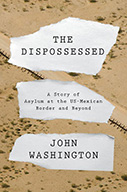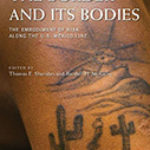The Dispossessed: A Story Of Asylum At The Us-Mexico Border And Beyond

Author: John Washington
Publisher: London; New York: Verso, 2020. 352p.
Reviewer: Russell Crandall | September 2021
Imagine this scenario: You are born and raised in a Salvadoran coastal community a few hours’ drive outside the capital San Salvador, the maximum distance of seemingly all provincial locales in this Massachusetts-sized Central American country. The year is 2016, and you are a not untalented soccer player active in the local league, which is actually quite competitive and serious despite the remote location. Your Corral de Mula squad is Arsenal and, when playing in a big rematch against nearby Juventus, you accidentally but brutally crash into an opposing player, El Monkey. Within a few days your unglamorous but dignified universe is upended in the face of blood-chilling warnings like ‘eres tumba’ (literally, you are a tomb). As it so happens, El Monkey’s brother is a ‘palabrero’ (chief) of the local Barrio 18 gang, and he wants your neck. Almost simultaneously, you receive solicitations to join Barrio 18’s arch-enemy, as they have promised protection against your ruthless ‘Barrio’ hunters, who, shockingly, are also residents of the broader beach town community. Rejecting this ‘invitation’ would make you one more statistic in a nation that—along with its so-called Northern Triangle neighbors Guatemala and Honduras—is one of the most violent places on earth.
Writing this impassioned and essential Age of Trump book, The Dispossessed, journalist and activist John Washington intrepidly chronicles the very real and seemingly forsaken life of this young Salvadoran young man, named Arnovis. The pain and struggle Arnovis endures is almost impossible to comprehend, but is vividly chronicled by Washington. “The end of Arnovis’s ulna cracking against El Monkey’s molars: and then two years of flight, Arnovis chased and detained by the merciless men-hunters, trying three times to enter the United States, twice deported, his daughter taken from him, lingering years of dread and occasional moments of panic.”
Through the story of this Salvadoran migrant thrown between the Border Patrol in el norte, to the vicissitudes of life under MS -18 tyranny at home, the author is impatient to manifest how the United States and the West have eviscerated asylum protections for the globe’s most exposed humans. As expected, given his deep antipathy for nationalism and xenophobia, the author devotes considerable ink to examining, and by extension, excoriating, the Trump administration’s anti-asylum, anti-refugee, and anti-immigration policies. There is of course more than a good share of overlap among these three categories. Even if so much of what makes the book riveting is patently awful or evil, Washington’s narrative is a crucial read for anyone interested in immigration policy or border dynamics. The book would have benefited from notes, or at least a bibliography, given how many facts and numbers the author mentions from beginning to end. Related to this, Washington’s account of Reagan era policy in Central America is intended to demonstrate the extent to which Salvador’s misery was in fact seeded by a blindly cold warrior. Washington (the capital, not the author) is needlessly simplistic and moralizing. He does cite a few authors and books in the text—Raymond Bonner, Joan Didion—but these works—all written during the height of the Salvadoran civil war when foreign reporters assumed it would be “another Vietnam”—have been largely debunked by subsequent scholarship.
Russell Crandall, Professor of Latin American Studies, Davidson College


